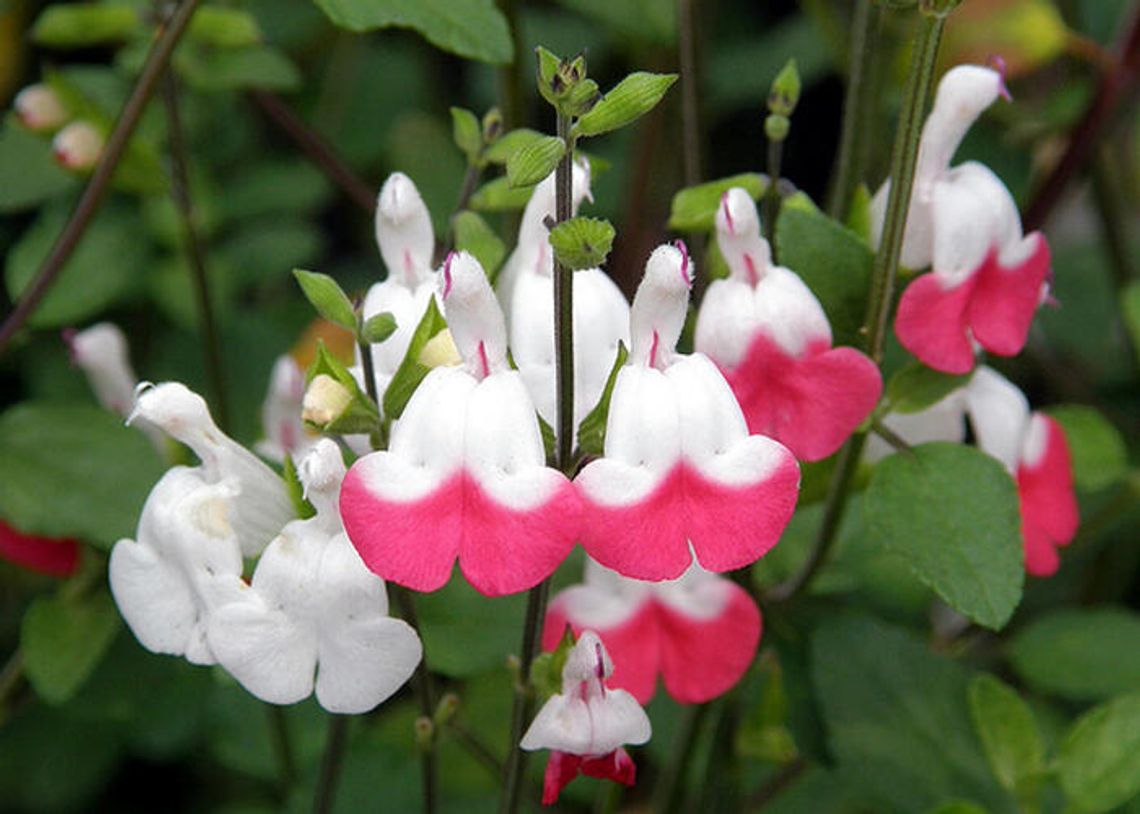[dropcap]P[/dropcap]lants from the salvia genus (known also as sages) have become very popular in the last few years due to their extreme heat and drought tolerance.
Although there are other plants commonly referred to as sage (i.e. Russian and Jerusalem sage), the salvia genus contains the true sages. The most well-known is probably Salvia greggii (aka autumn sage). Culinary garden sage is also a salvia that’s just as hardy as its ornamental counterparts.
Alongside these more common salvias, there are several you may never have heard of that look beautiful in the landscape, and will give you a little bit of variety in your yard.
1. Hot Lips (Salvia microphylla) is similar in growth habit to autumn sage, but due to its slightly larger leaves it will tolerate anything from full sun to light shade and still thrive. The flowers are an unusual combination of red and white. Sometimes they are all red or white but will also bloom in a mix of red and white on the same flower. Because of its red flowers, this plant is popular with hummingbirds. Hot lips will grow to a height and width of about 3’. It survived the last three years without missing a beat — even in a neighborhood where no outside watering was allowed last summer.
2. Salvia namiensis is another trooper. (No common name for this; I call it oak-leaf sage.) This low evergreen sub-shrub is a very unusual sage. The leaves are lobed like an oak leaf, and it has a more prostrate growing habit, reaching only 18”- 2’ tall, but can grow to a width of 5’. The pale purple flowers attract butterflies and bloom most of the growing season. This is another salvia that survived the last three years without any assistance at all, making it through last summer in full sun on a corner of a yard without irrigation… and it still looks great.
3. Forsythia sage (Salvia madrensis), named for its lemon yellow flower spikes, is another top performer. It loves the shade and grows quite tall, so it makes for a beautiful backdrop to other shade loving plants (like majestic sage). Another survivor from the last few years of extreme Texas weather, this salvia typically blooms later in the season and into the winter time, giving extra color when many plants have finished their bloom cycles for the year.
4. May Night (Salvia nemerosa) is a beautiful early season bloomer. It is a shorter sage with spikes of dark purple or pink flowers from early spring until the heat of summer. Although it can get a little rangy in the extreme heat, it bounces right back with little assistance.
5. Salvia discolor (Andean sage) is a tender perennial with gray leaves, white stems and almost black flowers. It has a semi-trailing habit and looks beautiful in a container or flowerbed in morning sun. In the full sun it gets too woody, so a bright porch or protected location is best. The flowers appear consistently from late spring until frost, or beyond if kept from freezing temperatures. Happy gardening everyone!
If you have a question for Amanda or Chris, send it via email to [email protected]. Or mail a postcard to It’s About Thyme:11726 Manchaca Road, Austin, TX 78748 www.itsaboutthyme.com











